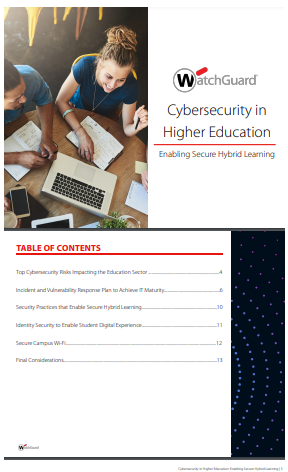
Cybersecurity in Higher Education
Enabling Secure Hybrid Learning
This eBook focuses on the most common security incidents and vulnerabilities that affect universities, how these events are influencing IT priorities, and what threat intelligence looks like for this industry.
Learn about the security practices that can help preserve a school's mission to deliver an enriching academic experience while enabling modern technologies to expand access to learning.
Notable Breaches Targeting Education
- 2020, Metropolitan Community College of Kansas City
638,186 records affected
In this ransomware attack, sensitive data on over 630,000 former, prospective, and current students may have been accessed by the hacker. - 2019, Clark County School District
559,487 records affected
As previously mentioned, this breach was part of the Pearson's Education, Inc. data breach that affected numerous school districts. - 2019, Georgia Tech
1.27 million records affected
A central database was hacked, potentially exposing the records of nearly 1.27 million students, faculty, and staff members. - 2018, San Diego Unified School District
500,000 records affected A phishing attack enabled hackers to gain access to the district's central student database.
82% of malware attacks target the education sector. In the US alone, cybersecurity incidents affecting schools have increased by almost 900% since 2019.
Ransomware
According to the 2022 Global Risks Report, 82% of malware attacks target the education sector. In the US alone, cybersecurity incidents affecting schools have increased by almost 900% since 2019. Similarly, in the UK, authorities report that ransomware attacks went up by more than 140% in the last two years
Phishing attacks
Phishing activity typically happens via email or text messages. In the higher ed space, the hacker often pretends to be an official from the university to gain access to student or system information. Phishing incidents can sometimes be difficult to detect and block, so security awareness is a key prevention resource to make available to students, faculty, and admins.
Data breaches
Universities store more than grade data. They have Social Security numbers and individual and business bank account information, among other sensitive data. According to a 2021 study by Comparitech, higher ed institutions and school districts have reported almost 1,900 data breaches, which means more than 28 million records have been leaked.
Use of outdated software
Colleges and universities rely heavily on software-as-a-service technology to enable teaching and learning. Continued use of end-of-life (EOL) software poses a risk to your system as attackers can exploit old security vulnerabilities. The use of unsupported software can also cause software compatibility issues as well as decreased system performance and productivity.

